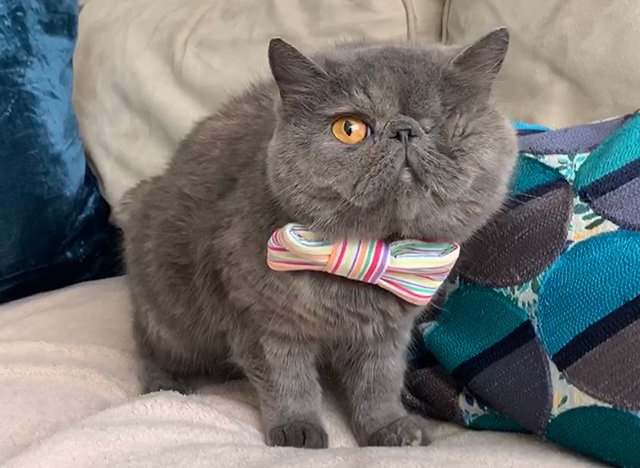NY State's Cat Declawing Ban Is Now Officially Law
July 22, 2019, 1:30 p.m.
New York is now the first state in the nation to ban the procedure.

Sadie Wilkins likes her claws just fine, thank you very much
Today, New York State became the first in the nation to ban the practice of declawing cats. Governor Andrew Cuomo signed the bill this morning. "By banning this archaic practice, we will ensure that animals are no longer subjected to these inhumane and unnecessary procedures," Cuomo said in a statement.
"I'm overjoyed," Assembly Member Linda Rosenthal, who first proposed the legislation back in 2015, told Gothamist. (Rosenthal is also the owner of two cats, Kitty and Vida.) "Today is that cats and animal lovers have been looking forward to for years."
Some people choose to declaw their cats because they are worried about their pets scratching their furniture. However, the procedure is described as an "amputation" by the American Veterinary Medical Association.
"Declawing a cat is not like getting a mani/pedi," Rosenthal noted back in June. "It's a brutal surgical procedure that involves removing the first bone of the cat's toe and part of the tendons and muscles."
And scratching is a essential part of a cat's behavior: "The act of scratching serves many purposes; it conditions the claws by removing aged cuticle, serves as a visual and scent territorial marker, provides defense from attack, and stretches the muscles of the limbs, thorax, and back," the AVMA explained in a study (PDF).
The issue raises a range of opinions within the veterinary community. Some vets are vehemently opposed, while others, after outlining the pros and cons, may opt to declaw a cat if the owners suggest they might abandon the cat otherwise. "It's most commonly performed as a convenience to curb unwanted—albeit very normal—scratching behavior. Most cats however can be trained to redirect this behavior to an acceptable object, e.g. a scratching post," Dr. Peter Soboroff, veterinarian at New York Cat Hospital, told us. "As client education has improved, indeed rates of declaw have dropped dramatically.
"There are circumstances—for instance, immunocompromised persons—where the risk of a cat scratch becomes a serious obstacle to keeping a cat. And less commonly, the surgery is performed for unmanageable aggressive behavior or medical problems affecting the claws," he added.
The New York State Veterinary Medical Society had opposed to the bill, "Medical decisions should be left to the sound discretion of fully trained, licensed and state supervised professionals."
"I believe that though the majority of vets dislike this surgery, most nonetheless feel it's a decision best made in a vet/client/patient relationship, and not something to be legislated," Soboroff explained. Still, "Having spent countless hours, however, counseling clients on the drawbacks, downsides, risks, and ramifications of surgery, I'm personally quite comfortable having had the decision largely taken out of my hands."
The State Senate, now controlled by the Democrats, passed the bill in June. The law will fine people who declaw cats without a legitimate medical reason $1,000.
Rosenthal, who calls the declawing "barbaric," believes the law will "teach a lesson to people who value their furniture above a cat’s ability to function... If you value your furniture, then don't get a cat."
There is a carve-out for cat declawing in special cases—"perhaps if the cat has a tumor," Rosenthal suggested as an example—but overall she believes the state's last declaw has happened.
"The veterinarian association in New York actually sent out an erroneous email that the bill has become law," Rosenthal said. "They jumped the gun... but it means everyone is on notice."
Cat declawing is banned in cities like Los Angeles and San Francisco, and Denver. Now Massachusetts is considering its own ban.